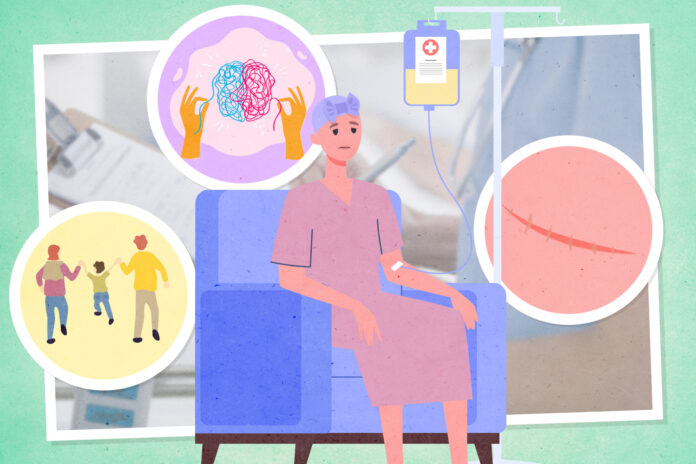It’s a well-known statistic that approximately 50 per cent of Canadians will be diagnosed with cancer in their lifetime. I knew there was a reasonable chance that it could happen to me.
What I didn’t know was that my time would come so soon.
In 2019, at the age of 36, I was diagnosed with Stage 3 invasive ductal carcinoma — a.k.a. locally advanced breast cancer.
Read more:
‘Frustrating’ and ‘devastating’: The domino effect of family doctor, LTC shortages on ERs
My children were one and three years old when I was blindsided with the diagnosis. I say blindsided because, up until the day my family doctor called to give me the results of my biopsy, everyone had assured me “it’s probably nothing. You’re too young to be diagnosed with cancer.”
Technically, they weren’t wrong: breast cancer in women under the age of 40 is rare. Only about seven per cent of those diagnosed with breast cancer have yet to clear their 30s.
Fighting back tears in the spring of 2020, waiting to speak to an oncologist because I knew I still had cancer in my body but wasn’t being taken seriously by my medical team.
Michelle Butterfield
What I didn’t know was living with cancer in my body would be less distressing than living life as a cancer survivor. My hair grew back, signalling to the outside world that I was “better,” but that couldn’t be further from the truth. I will never fully shed this disease, no matter how long I remain in remission.
I recently came across a quote on Instagram that sums up my post-cancer life in the most heart-wrenching way: “Just because I’m living disease-free doesn’t mean I’m free of this disease.” There’s not a day that goes by that I don’t think about cancer, worry that it’s going to come back, try to quell intrusive thoughts that I might not live to grow old with my husband and watch our children grow up.
Helping others while healing myself
I have done my very best to be an advocate for young cancer patients, which, I have learned, is a double-edged sword. I want nothing more than to help other young breast cancer patients feel less alone. I lend my voice and time to a host of organizations and fundraisers, I create opportunities for young cancer survivors to connect, and I share openly and with vulnerability on social media.
When I was first diagnosed with breast cancer I happened to stumble across a group of other young women in my city who were going through the same ordeal. The “Pink Ladies” (now the Southern Alberta Breasties) would regularly meet for coffee, walks and chats, and they invited me into their cancer club with open arms.
That group provided, and continues to provide, a lifeline for me. A cancer diagnosis early in life is isolating, and the vast majority of my peers have never had to face their own mortality in such an abrupt way, nor deal with the aftermath of such a traumatic life event. The Breasties get it. They speak the language of cancer and know that part of my heart.
Over the past three years, our members have worked tirelessly to catch other young women coming into the cancer system, offering them a soft place to land surrounded by other people who have walked the same path. When I was welcomed into the group there were about 12 members. Now there are 200.



